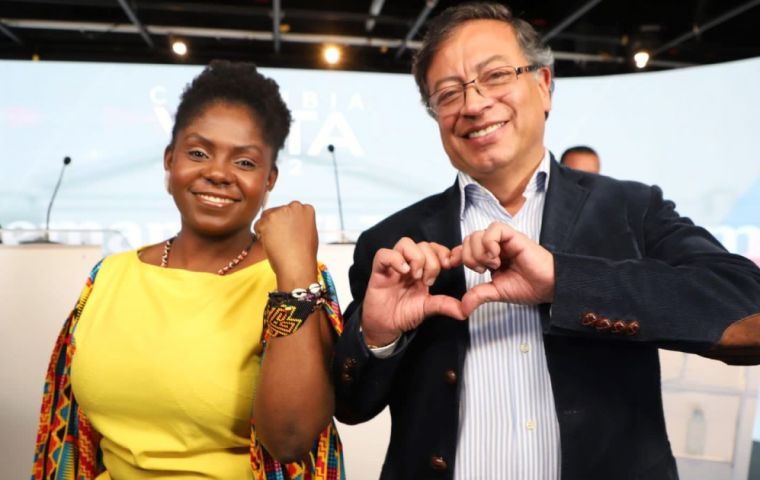MercoPress. South Atlantic News Agency
Senator Petro ahead in all polls for Sunday's elections in Colombia
 If Pacto Histórico wins, Colombia would have a former guerrilla man and an Afro-descendant woman at the helm.
If Pacto Histórico wins, Colombia would have a former guerrilla man and an Afro-descendant woman at the helm. The 62-year-old Senator Gustavo Petro is poised to win Sunday's presidential elections in Colombia, according to all surveys, in what would be a historic turn to the left for the only NATO associate country in South America.
The leader of the leftwing Pacto Histórico coalition has studies in Environment and Population Development from the Catholic University of Louvain and a PhD in New Trends in Business Administration from the University of Salamanca.
Petro, who was beaten by incumbent President Ivàn Duque in the 2018 Presidential runoff, hinges his campaign on stopping the exploitation of mining-energy resources and making the transition to clean energy, due to global environmental problems. He also favors a series of changes in health, economy, and education, which are regarded as a threat to the status quo.
Since his appearance in the electoral race, Petro is feared to replicate the case of Venezuela since his narrative is very similar to that of the late Hugo Chávez Frías and his successor, Nicolas Maduro Moros.
Petro's background also includes being a member of the Movimiento 19 de Abril (M-19) guerrilla group, amnestied in the 1990s. As a lawmaker, he has denounced the connections between paramilitary groups and Bogotá under Alvaro Uribe (2002-2010), his fiercest political rival.
Between 2012 and 2015, the leftwing candidate has also been mayor of Bogota, which is considered to be the second-highest office in the country after the Presidency. He was overthrown by order of the Attorney General's Office amid controversies and legal disputes.
The grandiloquent Petro is often critical of the country's political model in a nation crossed by social inequality, discontent, and political fracture.
His running mate is Francia Márquez, a woman of African descent, as convincing in her speech as Petro, through a language that addresses the marginalized and excluded in Colombian society. Márquez, a lawyer and mother of two, has been a social leader and environmental defender, who often recalls her humble origins, including having been a cleaning worker and artisanal miner.
In the runoff against Duque, Petro obtained over 8 million votes and this time around his political movement was the most voted in the Legislative elections, although he would need to reach agreements with independent and center parties to govern. Polls show him as a sure winner in the first round with 40% of the vote and also in the run-off against any of the other candidates.
In Brazil, former President Luiz Inácio Lula Da Silva has expressed his support for Petro.




Top Comments
Disclaimer & comment rulesCommenting for this story is now closed.
If you have a Facebook account, become a fan and comment on our Facebook Page!